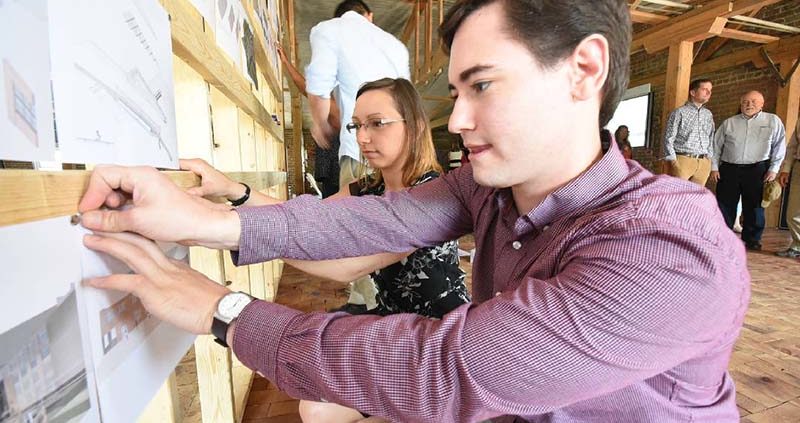UTK Students Collaborate on Smart Communities Initiative
(via Tennessee Today)
From seeking new uses for old buildings to finding ways to stimulate tourism, University of Tennessee, Knoxville College of Architecture and Design students are putting classroom lessons into practice in collaboration with Lenoir City, Tennessee, as part of this year’s Smart Communities Initiative (SCI).
“Our Smart Communities Initiative is now in its third year and we’re excited to collaborate with our program partner, Lenoir City, on a cluster of projects focused on the downtown area,” said Kelly Ellenburg, director of UT’s Office of Service-Learning, which oversees the SCI.
The program pairs faculty and students with Tennessee cities, counties, special districts and other governmental organizations to engage in real-world problem solving aimed at improving the region’s economy, environment and social fabric. SCI is a key component of Experience Learning, the university’s initiative that emphasizes experiential learning.
City Administrator Amber Scott-Kelso said Lenoir City officials hope to get some fresh, innovative ideas for improving their historic downtown area.
“Our goal is to give downtown Lenoir City a sense of place,” she said. “If we lose downtown, we lose our history and ability to reflect upon the past, as well as any hope for preserving that history for future generations.”
Scott-Kelso, a UT alumna, said she’s excited about what SCI means for UT students.
“There is no amount of classroom time that can compare to the applications of such in a real-world” setting,” she said, adding that she hopes the work allows students to “learn how to interact with those outside the classroom—how to properly articulate themselves and their ideas.”
Here’s a look at the five SCI courses now under way:
Downtown Lenoir City improvements
Eleven third-year architecture students in Professor Tricia Stuth’s design studio are looking at the adaptive reuse, expansion and redevelopment of several properties.
The students are considering ways to adapt the current Lenoir City Town Hall and site for future use by the Lenoir City Fire Department, adapt the former SunTrust Bank building and site for future use by the Lenoir City Schools Administration, and redevelop a retail strip for future medium-density housing that will be within walking and biking distance of Fort Loudoun Lake expanding greenways and cultural sites.
These projects “reflect the city’s commitment to economic development and revitalization of Lenoir City’s historic Main Street and downtown business district,” Stuth said. “There are several exciting initiatives under way already, including street and façade improvements.”
Stuth said the work will help students learn about the regulatory, economic, social, ecological, and spatial factors that influence a local government’s decisions regarding civic resources, space and identity.
Marketing and sustainable tourism
Stefanie Benjamin, assistant professor of retail, hospitality, and tourism management, is teaching a strategic management class studying niche tourism the area can attract and sustain. They will produce a sustainable tourism marketing plan, rack card and photography portfolio.
Benjamin won a Teaching Innovation Grant from UT’s Tennessee Teaching and Learning Center to help her students use a data collection methodology called photo voice. The students are using iPads and smartphones to take photos around Lenoir City—capturing the positive and negative attributes they see—in order to critically analyze potential tourism niche markets. The students’ photos will be showcased in a community reception in Lenoir City as part of their final report to city officials.
The class also will participate in several improvisation and empathy workshops to learn more about communicating, collaborating, and listening.
“The Lenoir City revitalization project has provided an interactive and unique opportunity for these senior students,” Benjamin said.
Downtown branding
Students in Professor Candace White’s public relations campaign course will create a strategic communications campaign for the revitalization of downtown Lenoir City.
“They will develop research-based strategies by first determining what would bring different segments of the Lenoir City population to the downtown area,” White said. “The goal is to develop a cohesive brand and taglines to build interest and excitement and to plan media strategies to reach people to help make the idea of downtown revitalization a reality for Lenoir City.”
Helping downtown merchants revitalize shops
Twenty-three seniors in retail and consumer science will propose retail strategies such as merchandise assortment planning, visual merchandising presentation, and promotional events, to improve the profitability and viability of existing businesses.
“They will use the knowledge gained from their varied coursework in consumer behavior, technology, customer loyalty, financial profitability and strategies for growth,” said Lucy Simpson, the department’s internship coordinator and course instructor.
In addition, the students will research and propose entrepreneurial opportunities for historic downtown Lenoir City.
Simpson said all of these seniors will be graduating in December 2016 or May 2017 and that “this project will prepare them for the real-world challenges in the retail business that they will encounter in the future.”
Working with Spanish speakers
Six seniors, all proficient in Spanish, are part of a longstanding Spanish service-learning class that is working with schools and other agencies in Lenoir City. About 18 percent of the area’s population speaks Spanish.
“Considering the growing Hispanic population in Lenoir City, we assume that an effective redevelopment plan in Lenoir City will want to incorporate fully its Spanish-speaking citizens,” said Distinguished Professor of Humanities Michael Handelsman from the Department of Modern Foreign Languages and Literatures, who is teaching the class along with Associate Professor Luis Cano. “Whether the needs are in marketing, education, public health, community outreach or whatever else Lenoir City prioritizes, our students’ principal role will be to assist with the language and cultural communication.”
The work will allow students to put their classroom lessons into practice, “which will enable them to move from thinking about Hispanics and their culture to thinking with Hispanics.”
Handelsman said this semester is just the start.
“We expect our involvement with the Lenoir City project to be an ongoing one, which will involve numerous students over several years,” he said.
Economic Impacts of Fort Loudoun Bridge
The Tennessee Valley Authority is building a new bridge from Blount County to Loudon County, and Lenoir City officials are contemplating what they might do with the old bridge.
Economics lecturer Ben Compton is acting as a consultant, evaluating what it will cost to retain the old bridge and revitalize the adjacent park area. City officials hope his work will lay the groundwork for soliciting contributions for the project.
More projects may be added in the spring.
—
Check out University of Tennessee at Knoxville on StudyArchitecture!




